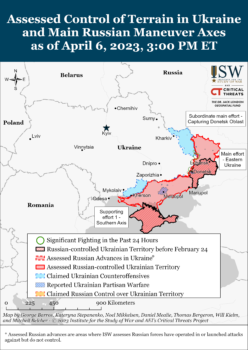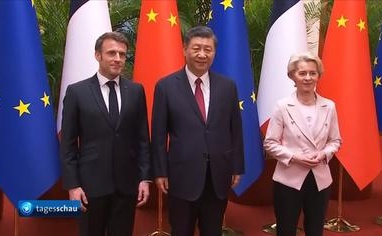(L to R): French President Emmanuel Macron, Chinese leader Xi Jinping, and European Commission President Ursula von der Leyen, Beijing, China, April 6, 2023 (Tagesschau)
Thursday’s Coverage: China — We Do Not Support Russia’s Invasion

Map: Institute for the Study of War
UPDATE 1222 GMT:
Kremlin spokesman Dmitry Peskov has pushed back on the Chinese-European meetings and Beijing’s public non-support of the Russian invasion, rejection of Vladimir Putin’s annexations, and pledge not to provide military support:
China is a very serious, very big power with its own sovereign position….This is not the kind of country that changes its positions rapidly under external influence.
UPDATE 1209 GMT:
Alongside his Russian counterpart Sergey Lavrov in Ankara, Turkish Foreign Minister Mevlüt Çavuşoğlu said that more needs to be done to ensure the deal lifting the Russian blockade of Ukraine’s Black Sea ports.
Çavuşoğlu said he agreed with Moscow on the need to lift restrictions on Russian grain and fertilizer exports.
Last July’s deal ending the Russian blockade on Ukrainian grain shipments through three ports was extended last month, but without clarity on whether it was for 120 days or only 60.
Lavrov claimed obstacles to Russian agricultural exports are increasing in a “failure” to implement the terms of deal. He declared that Russia will work outside the agreement if the obstacles are not removed.
UPDATE 0801 GMT:
Russian prosecutors have requested a prison sentence of 25 years for opposition politician Vladimir Kara-Marza.
“Unexpectedly for Vladimir and I, the court heard the arguments today. The process is moving quite fast and the prosecutor has asked for 25 years in prison,” said lawyer Mariya Eysmont.
Kara-Murza, 41, was detained in April 2022 on charges of spreading “fake news” about the Russian army after he criticized Vladimir Putin’s invasion.
He is now also accused of high treason and of affiliation with an “undesirable” organization. The trial is being held behind closed doors in a Moscow court.
Kara-Murza was a close associate of assassinated opposition leader Boris Nemtsov and exiled Kremlin critic Mikhail Khodorkovsky.
UPDATE 0753 GMT:
More than 3 of 4 Russian manufacturers have been negatively affected by international sanctions over the past year, according to a survey by Moscow’s Higher School of Economics.
Of almost 2,000 companies, 77% said they had suffered. They cited price hikes for raw materials on the domestic market; import cuts in goods and services; logistical issues; and problems with equipment imports and maintenance.
The impact has been felt most in the metallurgy, pharmaceuticals, electrical engineering, car manufacturing, chemical, rubber, and plastic industries.
The 23% of respondents who said they had benefited from sanctions included chemical, electrical engineering, machinery and equipment, and transport engineering manufacturers who said they had broken into new markets.
Exporters were more likely to cite a “positive” effect of the sanctions, while companies with international links and those relying on imports were on the “negative” side.
UPDATE 0731 GMT:
UK military intelligence assesses that Russia’s Wagner Group mercenaries have advanced in Bakhmut in eastern Ukraine.
The analysts say it is ““highly likely” that the fighters have finally taken the west bank of the Bakhmutka River after being stalled for weeks.
Earlier this week Wagner head Yevgeny Prigozhin posted a video clipo in which he was apparently atop a building across from the destroyed administrative block in the center of the city.
Russian forces have pursued an 11-month assault to capture Bakhmut, a salt-mining center with a pre-invasion population of about 70,000.
Ukrainian resistance denied Vladimir Putin a symbolic victory by the first anniversary of the invasion and then by April 1.
But Ukraine President Volodymyr Zelenskiy indicated on Wednesday, during an official visit to Poland, that forces might finally withdraw if military commanders deemed it necessary.
The spokesperson for Ukraine’s Eastern Military Command, Serhiy Cherevatyi, said Friday that Russia is concentrating all its efforts and “paying a high price” for the capture of Bakhmut.
Military analysts says the city has little strategic value, even if overrun by the Russians. However, the Kremlin needs to display a victory, given on significant Russian advance since last July.
UPDATE 0643 GMT:
The US Defense Department is investigating claims of a leak of classified files, setting out details of US and NATO plans to help Ukraine’s preparations for a spring offensive.
“We are aware of the reports of social media posts, and the Department is reviewing the matter,” said the Department’s Deputy Press Secretary Sabrina Singh.
Circulating on Russian State outlets and social media, the documents have charts and details about weapons deliveries, battalion strengths, and other sensitive information. The most recent is dated March 1.
Military analysts said the documents appear to have been modified as part of a Russian disinformation effort. They overstate American estimates of Ukrainian war dead and understating estimates of Russian troops killed.
One document set out training schedules of 12 Ukraine combat brigades. It said nine of them are being trained by US and Nato forces, and need 250 tanks and more than 350 mechanized vehicles.
Another points to the expenditure rate of US-supplied HIMARS high mobility artillery rocket systems, which have enable Ukrainian counter-offensives with strikes on Russian ammunition dumps, infrastructure and logistics, and concentrations of troops.
ORIGINAL ENTRY: Meeting in Beijing on Thursday, Chinese and European leaders pushed back on Vladimir Putin’s invasion of Ukraine.
French President Emmanuel Macron and European Commission President Ursula von der Leyen each had high-profile discussions with Chinese leader Xi Jinping, just over two weeks after Xi saw Putin in Moscow.
In choreographed statements, Macron and von der Leyen both issued warnings to China not to cross the red line of lethal military aid to Russia. The French President had said upon his arrival in Beijing:
We have decided since the beginning of the conflict to help the victim, and we have also made it very clear that anyone helping the aggressor would be an accomplice in breach of international law.
Von der Leyen followed up on Thursday with the message that any arms shipments to Russia would “significantly harm” relations. Macron endorsed the statement.
Macron then said as he shook hands with Xi in front of the Great Hall of the People, “I know I can count on you to bring back Russia to reason and everyone back to the negotiating table.”
The Chinese made a pre-emptive response to the Europeans before Macron and Von der Leyen’s arrival. Fu Cong, the Permanent Representative to the European Union, said Beijing did not support Putin’s invasion and would not provide any military help.
On Thursday, Xi did not directly refer to the issue. However, his general statement emphasized diplomacy and a cooperative relationship with the Europeans.
China urges all parties to remain calm and reason, and work together to create conditions for peace talks….We oppose attempts that would add fuel to fire and complicate the situation.
China…supports Europe in putting forward ideas and proposals for a political solution to the Ukraine crisis based on its own fundamental and long-term interests, and promote the establishment of a balanced, effective and sustainable European security framework.
Macron also indicated a Chinese pushback against Putin’s declaration that he will put Russian nuclear weapons in neighboring Belarus. The President said he and Xi agreed that nuclear weapons should be excluded from the conflict.
A “French diplomatic source” said, after the meeting between Xi and Macron, that China is ready to work with France to “push hard” for peace talks.
The official said Xi indicated that he is ready to call Ukraine’s Zelenskiy “in his own time”. Earlier, Von der Leyen said she had encouraged the Chinese leader to make contact.
China Choosing Trade and Investment Over Putin?
In Fu Cong’s remarks, China had indicated a priority on restoring economic relations with Europe, with a lifting of sanctions and advance on a stalled Comprehensive Agreement on Investment.
Von der Leyen said Thursday’s discussions included imbalances in trade between the EU and China. During a meeting with Chinese Premier Li Qiang she said relations between the EU and China had grown “complex in recent years”: “It is important that we discuss all aspects of this relationship together today…[in the] volatile geopolitical environment”.
Responding to the Chinese and European statements, Kremlin spokesman Dmitry Peskov tipped off Russia’s disappointment that the Putin-Xi meeting on March 20 had not brought Chinese support.
Undoubtedly, China has a very effective and commanding potential for mediation. But the situation with Ukraine is complex. So far there are no prospects for a political settlement.

